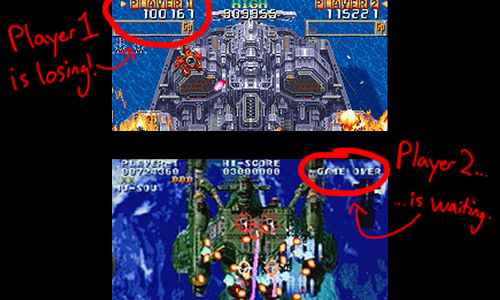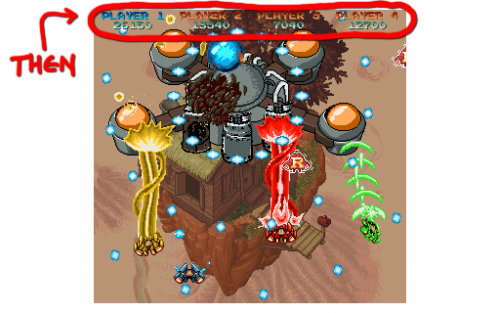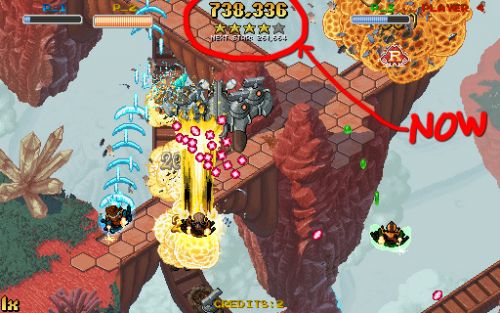
Not, like, super-cooperative?
SIMULTANEOUS DOES NOT EQUAL COOPERATIVE
We played a goodly number of shoot-em-ups in our preparations for Jamestown, and as lovers of co-op, we made sure to play every one of them with as many players as it would allow (almost always 2). It’s no exaggeration to say that we conducted a comprehensive survey of the genre’s entire history. Hell, we even made our friends play them while we watched. And what we learned (besides respect for our elders) was that almost none of those games had been designed with cooperative play in mind.
When it comes to invoking a sense of camaraderie and teamwork, the disparity between those games and, say, Left 4 Dead, was too large to even use the same word when discussing them. Left 4 Dead is cooperative. Rock Band is cooperative. Those games were consciously designed to create cooperative moments that would resonate with their players, moments that would show up in the gaming war-stories they told days or even years later.
But sadly, the most accurate term to describe our venerable shoot-em-ups’ 2-player modes is simultaneous.
And that’s cool! I mean, sure, there’s Tim flying around as Player 2. We can shoot stuff together, sometimes the same stuff; all very cool. But it’s a far cry from the kind of co-op that gets us out of bed in the morning. We wanted players to hoot and holler at each other as the game intensity increased, make risky plans and back each other’s play no matter the cost; Han Solo their friends out of bad situations at the last possible second, and celebrate each other’s heroism whether or not they had even survived the battle. Win or lose, we wanted them to do it together.
That’s hard to manage in a game where Player 2 can just gobble up all the shared lives, die for the last time, and sit around waiting for Player 1 to finish having fun alone. And even if they both survive for a while, their individual high score counters are right there on the HUD, silently reporting their relative levels of alien-eradication skill for the entire session. Making sure they know who’s winning.
We have a word for that sort of gameplay: competitive.
To find other games that achieved our goals, we had to zoom out so far that we weren’t even looking at shoot-em-ups anymore. Games like L4D and Rock Band do a brilliant job of keeping all the players engaged for the vast majority of the game session, and of encouraging them to behave like a team. We looked hard at what those developers (and many others) were doing to create the sort of experience we were shooting for. After much discussion and playtesting, here are the solutions we arrived at for our game:
No Dueling Digits
Electing to focus on 4-player co-op in a PC game without online multiplayer was probably the boldest decision we made during Jamestown’s development. Believe it or not, going with a single high score value in co-op could well be the second-boldest.
Serious shooter players are seemingly hard-coded to optimize their high scores, and the culture of leaderboards and multiplayer gaming in general all reinforces the assumption of One Player: One Score. Jamestown actually had 4 individual high scores on-screen in the early days, and our playtesters clearly enjoyed competing for numerical dominance.

Jamestown's misspent youth
But the fact was they weren’t having the kind of fun we were chasing after; for every elated winner, there were always between one and three deflated losers.
By pouring every player’s score contributions into the same bucket, we created a philosophical keystone and stuck it right there on the HUD for every player to see: you’re all in this together. There was nothing left to compete for, besides actually grabbing the “vaunt” gold pieces that drop out of enemies. And because the careful distribution of that gold across the whole team is critical to keeping everyone alive, gold-grubbing behavior tends not to last long. Besides, getting to the very high scores that leaderboard play demands requires extremely careful choices about who grabs how much gold, and when, which further harnesses the serious player’s min-maxing instinct to the cooperation wagon.

What now?
As shipped, Jamestown’s co-op mode has literally no differentiating player-evaluation stats at all, with the possible exception of the end-of-level “heraldry” labels like “Field Surgeon” and “Most Deadly.” And it’s no accident that that even those are all non-numerical and entirely positive: we found that negative heraldry (along the lines of “Bullet Sponge” or even “Least Deadly”) provoked shame, discouragement, and sometimes even anger in the playtesters who received them. In a competitive game like GoldenEye (the inspiration for that particular feature), that sort of thing can be a fun way to stoke the fire for round 2. Sadly, in a cooperative game, even something that innocuous turned out to be a real tonal discontinuity.